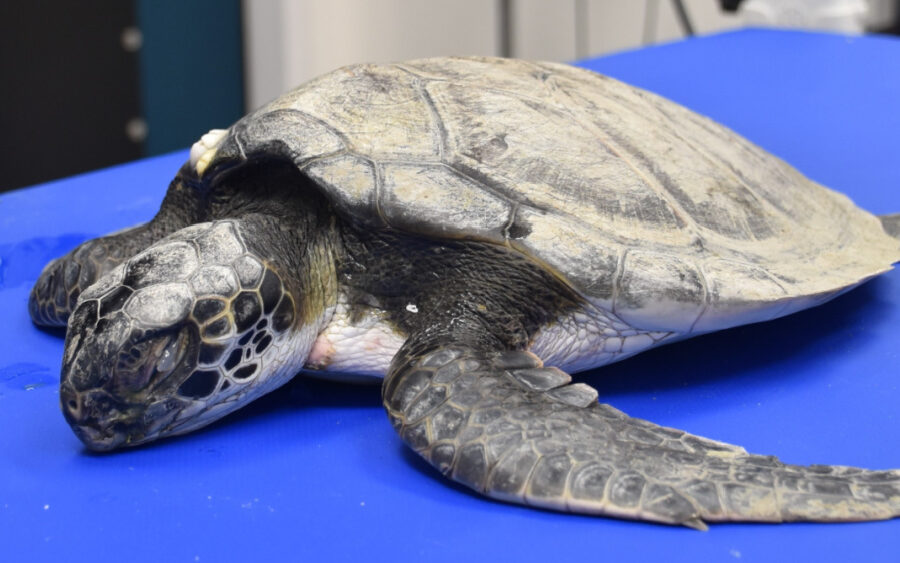Green (Chelonia mydas)
Stranding Location: Huntington Beach State Park, SC
Arrival Date: 12/22/22
Age: Juvenile
Weight: 2.5 kg (5.5 lbs.)
Case History
In the last two weeks of the year, most of the United States experienced extreme cold weather from a polar vortex, including the Lowcountry. As air and water temperatures dropped rapidly for several days, Karina was the first of a few turtles that stranded from cold stunning. Karina’s body temperature was in the 40s when they were found on the beach. South Carolina Department of Natural Resources (SCDNR) volunteer transporter Vicki Hardwick was dispatched and braved a chilly ride down to the South Carolina Aquarium to keep Karina’s body temperature from rising too quickly. Karina was in rough shape and needed to be treated as quickly as possible.
Treatment
When Karina was admitted to the Sea Turtle Care Center™ they were lethargic and very emaciated. It was clear this turtle was already compromised before the cold weather hit the area. Karina’s body temp had risen to the low 50s during transport, and it was very difficult to detect a heart rate. When a sea turtle cold stuns, it is not uncommon for them to have a lower respiration and undetectable heart rate. A drug called Atropine was given to help increase Karina’s heartrate and x-rays were taken to evaluate her lungs for any signs of pneumonia. After a few minutes, a heart rate was detected via ultrasound, and the turtle was breathing more frequently. Blood was drawn to evaluate their chemistries and other issues they may be dealing with. Karina’s bloodwork indicated that they were severely dehydrated, among other issues. Karina was given a large volume of fluids with vitamins to help with the rehydration process. They were also given some other medications to help with the respiratory acidosis they were experiencing due to a lowered respiration rate. Karina was monitored closely for the remainder of the evening and left to rest comfortably in a foam-padded bin overnight.
Update
January 15, 2023: Karina was very touch and go for a few days following their admit. They continued to received subcutaneous (under the skin) fluids to help aid in rehydration. Karina was still very lethargic and spent the majority of her days sleeping in a floating kiddie pool that was attached to the inside of their tank. Floating kiddie pools allow the patient to be in a filtered tank but in shallow enough water that they can rest and comfortably take breaths. Karina was also started on two different antibiotics to help combat the pneumonia that was present on x-rays and to prevent any secondary infections caused by the cold stunning. Karina has started eating her fish, but is not a fan of the lettuce yet. After spending about a week and half in the floating kiddie pool, Karina became more active; we decided to swim test her at a low water level in her tank. Karina immediately began swimming around her tank and was able to rest on the bottom. Though we have seen an improvement in the past few days and are hopeful that this positive trend continues, Karina’s prognosis is guarded. Send Karina all the good vibes!
February 15, 2023: As expected, the tissue affected by frostbite on Karina’s flippers has begun to slough off. We initially began treating the wounds topically and with cold laser therapy. This month however, in an effort to promote healing, we decided to take a more of a hands-off approach to Karina’s treatments. Karina is receiving oral antibiotics, and their appetite and activity level have improved greatly! They are eating all their fish and veggies and swimming well in a full tank. Once Karina has finished the oral antibiotic series, we will pull them for a physical exam and repeat radiographs. Fingers crossed that this little green continues to make strides in their recovery!
March 15, 2023: Karina has been recovering wonderfully over the last month. The external wounds on the flippers and beak have healed well and now have healthy tissue with no more fibrin, covering. We pulled Karina just the other day for an exam, including weight, measurement and follow-up radiographs to assess the bone damage. We were pleased to find that the osteomyelitis lesions appear quiet, with no new areas of bone loss. Karina swims very actively and uses all of their flippers well. With some more time and TLC, we are optimistic that Karina will make a great recovery!
April 15, 2023: Earlier this week, Karina had another radiograph re-check to see if their osteomyelitis is still staying at bay. Diagnostic imaging showed us that it is, in fact, quiet! Karina continues to be a good eater and shows good mobility, especially when they interact with their enrichment.
May 15, 2023: Karina has been a model patient in rehab — they’ve been eating well, defecating often, interacting with their enrichment and are healing so nicely! Keep your fingers crossed that Karina gets to go back home sometime soon!
June 15, 2023: This past month was full of excitement for Karina! Karina was tagged and evaluated for release, and after healthy bloodwork results came back, they were cleared! We released Karina this past week at Cape Romain National Wildlife Refuge, and we wish this little one the best of luck back out in the ocean!


